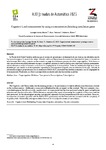Mostrar o rexistro simple do ítem
Cognitive Load measurement by using a concurrent multitasking simulation game
| dc.contributor.author | Larraga, Blanca | |
| dc.contributor.author | Ruiz Bejerano, Verónica | |
| dc.contributor.author | Gutiérrez, Álvaro | |
| dc.date.accessioned | 2023-10-06T08:05:46Z | |
| dc.date.available | 2023-10-06T08:05:46Z | |
| dc.date.issued | 2023 | |
| dc.identifier.citation | Larraga-García, B., Ruiz, V., Gutiérrez, Á. 2023. Cognitive load measurement by using a concurrent multitasking simulation game. XLIV Jornadas de Automática, 59-64. https://doi.org/10.17979/spudc.9788497498609.059 | es_ES |
| dc.identifier.isbn | 978‐84‐9749‐860‐9 | |
| dc.identifier.uri | http://hdl.handle.net/2183/33551 | |
| dc.description.abstract | [Resumen] La Teoría de la Carga Cognitiva establece que el proceso de aprendizaje o el desempeño de una tarea se ven afectados cuando hay una sobrecarga en la memoria de trabajo. Además, realizar múltiples tareas de manera simultánea también tienen un impacto en est sobrecarga. Este trabajo presenta una herramienta, un juego de multitareas, que permite inferir carga cognitiva. Se ha llevado a cabo una prueba experimental utilizando el juego y recogiendo información tanto subjetiva como objetiva de todos los participantes. Adicionalmente se analizó el impacto de aumentar la complejidad de la tarea primaria. Todas las variables fisiológicas se vieron afectadas por este cambio en la tarea primaria, especialmente la temperatura corporal y los movimientos de los ojos. Además, la información subjetiva proporcionada con el cuestionario NASA-TLX y la escala Paas también aumentaron con la complejidad de la tarea primaria. Finalmente, se obtuvo una importante correlación entre las dos medidas subjetivas. | es_ES |
| dc.description.abstract | [Abstract] The Cognitive Load Theory states that the learning process or the performance of a task is affected when there is an overload on the working memory. Additionally, concurrent multitasking has also an impact on this overload. This work presents a tool, a multitasking game that allows to infer cognitive load. An experimental test has been performed using the game and gathering subjective and objective information. Within this test, an analysis of the impact of increasing the complexity of the primary task has been performed. All the physiological variables were affected, especially the body temperature and the eye movements. Moreover, the subjective information provided with the NASA-TLX questionnaire and the Paas scale also increased with the complexity of the primary task. Additionally, a strong correlation between the two subjective measures was obtained. | es_ES |
| dc.language.iso | eng | es_ES |
| dc.publisher | Universidade da Coruña. Servizo de Publicacións | es_ES |
| dc.relation.uri | https://doi.org/10.17979/spudc.9788497498609.059 | es_ES |
| dc.rights | Attribution-NonCommercial-ShareAlike 4.0 International (CC BY-NC-SA 4.0) https://creativecommons.org/licenses/by-nc-sa/4.0/ | es_ES |
| dc.rights.uri | http://creativecommons.org/licenses/by-nc-sa/3.0/es/ | * |
| dc.subject | Carga cognitiva | es_ES |
| dc.subject | Multitarea | es_ES |
| dc.subject | Tarea primaria | es_ES |
| dc.subject | Datos subjetivos | es_ES |
| dc.subject | Datos objetivos | es_ES |
| dc.subject | Cognitive load | es_ES |
| dc.subject | Multitasking | es_ES |
| dc.subject | Primary task | es_ES |
| dc.subject | Subjective information | es_ES |
| dc.subject | Objective information | es_ES |
| dc.title | Cognitive Load measurement by using a concurrent multitasking simulation game | es_ES |
| dc.type | conference output | es_ES |
| dc.rights.accessRights | open access | es_ES |
| UDC.startPage | 59 | es_ES |
| UDC.endPage | 64 | es_ES |
| dc.identifier.doi | https://doi.org/10.17979/spudc.9788497498609.059 | |
| UDC.conferenceTitle | XLIV Jornadas de Automática | es_ES |
| UDC.coleccion | Publicacións UDC | es_ES |
| dc.relation.projectID | info:eu-repo/grantAgreement/EC/H2020/101021836 | es_ES |






